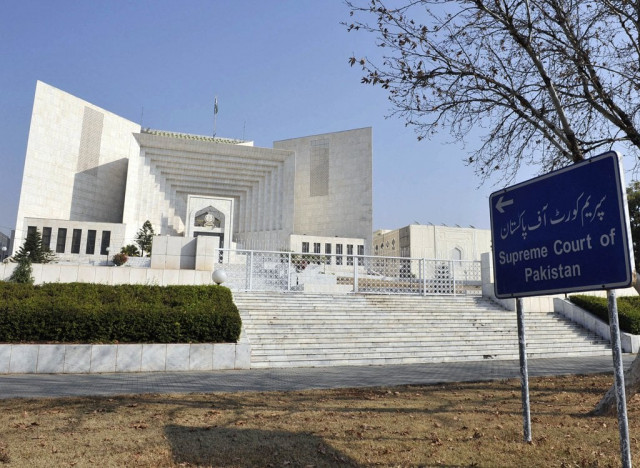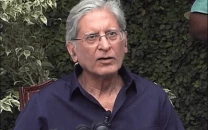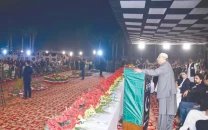SC can interpret Constitution, not amend it: Justice Azmat
Article 62(1)(f) must be interpreted with great care; it bars permanent disqualification of lawmakers

PHOTO: AFP
He said that although the apex court was empowered to interpret the Constitution, it could not amend it.
According to him, it is an equally elemental principle of interpretation of the Constitution that nothing can be added thereto, therefore, we cannot read into Article 62(1)(f) …, a period of such lack of qualification, which is not mentioned therein.
“I have had the privilege to go through the judgment of my learned brother Umer Ata Bandial, J., though I concur with the conclusions drawn in the said judgment but I do not find myself in agreement with reasoning employed in its entirety”, stated Justice Saeed in his additional note in the judgment.
Permanent disqualification of lawmakers was barred under Article 62 (1) (f), he wrote.
Disqualification is not for life, contends Sharif
“Such arguments are perhaps more suitable to the floor of Majlis-e-Shoora (Parliament) than at the bar before this Court. We, as stated above, can only interpret the Constitution not amend or change it. This aspect of the matter is rather ironic as several persons before us were or had been the Members of Majlis-e-Shoora (Parliament) at some point of time and may have passed the amendments, which now stand in their way,” he adds.
“Words and expressions denoting the attributes for being qualified to be a member of Majlis-e-Shoora (Parliament), as spelt forth in the aforesaid provision, leaves no manner of doubt that the same i.e. Article 62(1)(f) of the Constitution is rooted in and inspired by our Islamic values. It is not necessary to dwell further on this aspect of the matter in the instant proceedings. However, the said provision must be interpreted with great care, caution and respect.”
He observed that Article 62(1)(f) of the Constitution is required to be interpreted as it stands today.
Supreme Court for setting high standards for lawmakers
“A plain reading of Article 62(1)(f) of the Constitution reveals that in order to be a Member of Majlis-e-Shoora (Parliament), the person must be, inter alia, sagacious, righteous, non-profligate, honest, and ameen. However, if there is a declaration by a Court of Law to the contrary i.e. he is not sagacious or righteous or non-profligate, honest, and ameen then such person shall not be qualified to be a Member of Majlis-e-Shoora (Parliament).”
Justice Saeed says that a declaration by the Court of Law would mean a conclusive finding. “Obviously, such finding would be with regard to a list before the Court, arising out of the violation of a law or non-fulfillment of a legal obligation. It is clear and obvious that lack of qualifications in terms of Article 62(1)(f) of the Constitution is the effect of a declaration by a Court of Law to the contrary, which is the cause. The obvious, legal and logical conclusion would be as long as the cause i.e. the declaration of a Court of Law holds the field, its effect i.e. the lack of qualification shall also prevail. This appears to be the only possible interpretation of Article 62(1)(f) of the Constitution.”
Justice Saeed lamented that none of the learned counsels, who appeared before the court “confronted the elephant in the room i.e. the obvious interpretation of Article 62(1)(f) of the Constitution is that lack of the qualification to a Member is the effect of declaration by a Court of Law, which is the cause and period of lack of qualification would be co-extensive with the period to the cause i.e. declaration. None of the learned counsels refuted the aforesaid obvious interpretation but only sidestepped the issue”.
21st constitutional amendment challenged in SC
“However, at the very end Attorney-General … Ashtar Ausaf Ali addressed the Court and in no uncertain terms stated that once declaration has been made by a Court of Law that a person is not sagacious or righteous or non-profligate or honest and ameen, such a person is not qualified to be a Member of Majlis-e-Shoora (Parliament). This lack of qualification is the effect of the aforesaid declaration, which is the cause and as long as the declaration by the Court holds the field, the person in respect of whom such declaration has been made will continue to be deprived of the qualifications to be a Member of Majlis-e-Shoora (Parliament).”
“The stand taken by the Attorney General for Pakistan is not only fair but is also in accordance with the obvious and self-evident intent of Article 62(1)(f).”
“Incidentally, this Court on more than one occasions has already held that lack of qualification suffered under Article 62(1)(f) … is in perpetuity”
SC larger bench to determine lifetime disqualification issue
“No doubt the period of disqualification in certain sub-articles of Article 63 … has been provided but such a sunset clause is not found in Article 62(1)(f) of the Constitution. The framers of the Constitution chose not to do so. This Court is empowered to interpret the Constitution but not to amend it. It is an equally elemental principle of interpretation of the Constitution that nothing can be added thereto, therefore, we cannot read into.”



















COMMENTS
Comments are moderated and generally will be posted if they are on-topic and not abusive.
For more information, please see our Comments FAQ